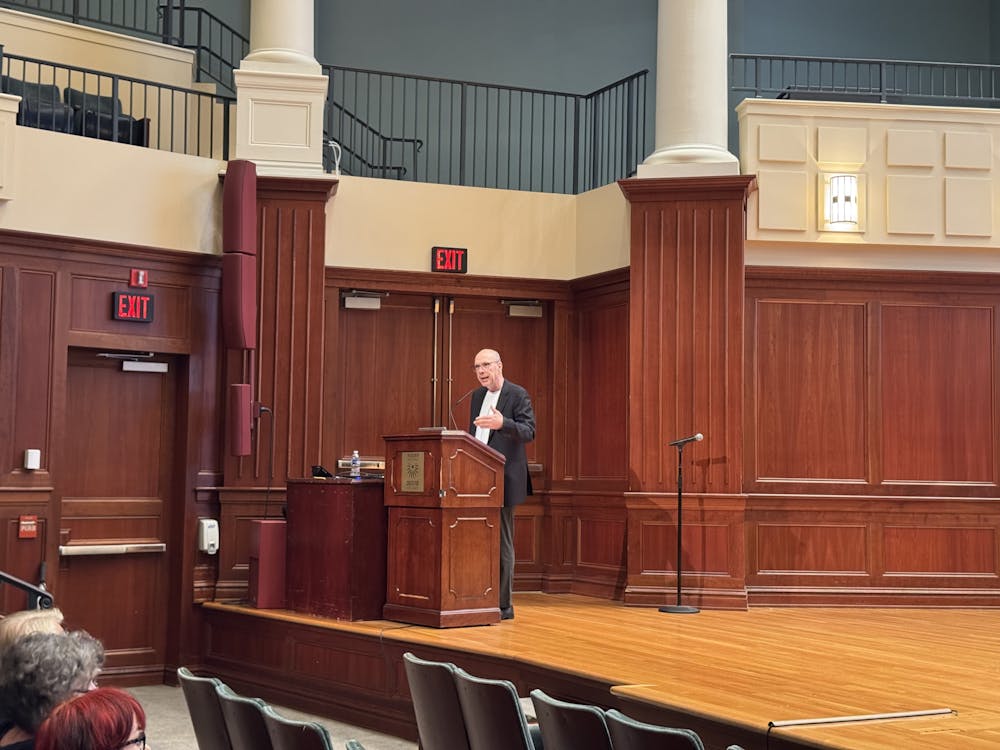By Matthew Kaufman
Editor-in-Chief
Jay Rosen, a professor of journalism at New York University, visited the College on Sept. 25, hosting a workshop with student and local media and lecturing on “pro-democracy” journalism.
A press critic and writer of the PressThink newsletter, Rosen argues that journalists must reframe their coverage of politics and elections in order to better serve the public.
“The election of 2024 is unlike any I have lived through,” Rosen said in his Mayo Concert Hall lecture. “American democracy is in danger. It’s even possible – not probable, possible – we could lose it. Journalists know all this, but their code says they cannot take sides.”
In order for journalists to better serve their audiences, while still remaining fair, Rosen developed a six-word mantra to lead coverage: “Not the odds, but the stakes.”
Instead of reporting solely on the latest campaign events or candidate speeches, the media scholar believes that journalists should reframe their coverage to focus more on the potential impacts that each candidate could have on voters’ lives and the country as a whole.
Rosen’s suggestions are based on a journalistic technique called the Citizen’s Agenda, which states that the topics journalists cover, especially in regards to an election, should be directly inspired by what citizens say is important to them.
“Instead of starting with the race – the candidates and the parties – you begin by asking the people you serve what they want this campaign to be about,” Rosen said in his lecture. “Do the work – get good, reliable answers to that question – and your journalism will add more value.”
To figure out what’s important to audience members, Rosen says journalists should conduct wide-ranging community outreach initiatives that ask participants one question: What do you want the candidates to be talking about as they compete for votes?
“As the answers pile up, you are creating something that can be extremely valuable,” said Rosen.
After compiling a list of the answers to the survey question, the media scholar recommends choosing six to eight of the most popular responses and then drafting a “voter’s agenda,” which would list the top issues that voters care about in a particular campaign.
After testing the draft agenda with the community stakeholders, the next step is to publish the agenda to the news organization’s website and begin implementing it in reporting.
“Turn what you heard from voters into a blueprint for better election coverage,” Rosen told the audience. “Dig deeply into the problems that you know are on people's minds — because you heard it directly from them.”
The Citizen’s Agenda reframes political agenda away from the “horse race” style of reporting, where news articles focus heavily on the day-to-day campaign activities and strategies of candidates. Instead, coverage emphasizes the issues that voters say are important to them, thus – in theory – serving the audience better.
In the academic view of political communication, this would be a shift away from “strategy” and “process” oriented stories into “issues” focused stories, which better inform and engage the reader. Strategy-focused stories are often viewed by academics as a sort of “junk food” that does not benefit the audience.
In his workshop with student and local media, Rosen heard from participants – including The Signal, WTSR 91.3FM, NJ Statehouse News and Civic Story – about how they cover politics and elections, and provided his advice about how to implement the Citizen’s Agenda into campus and local reporting.
The key, according to Susan Haig of Civic Story, is to “empower” the audience with engaging journalism.
“Our sense is news, if it’s not empowering citizens, there’s no middle ground, then it’s effectively disempowering citizens, even if it’s not trying to do that,” said Haig, a trustee of the nonprofit news site that focuses on civics and sustainability.
Participants of the workshop and listeners of the lecture came away with new ideas and inspiration for how to tailor their coverage to better serve their communities.
“I think this requires more of a commitment to giving people who are interested in learning about the races beyond just surface issues and engaging them in a way that gets them to participate in the democracy, really in a meaningful and important way,” Deborah Howlett of NJ Statehouse News told Civic Story.




